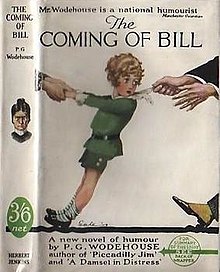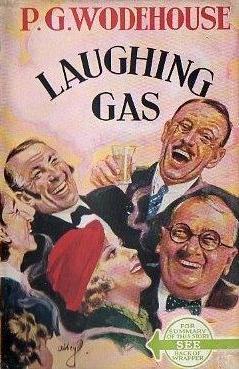
Laughing Gas is a comic novel by P. G. Wodehouse, first published in the United Kingdom on 25 September 1936 by Herbert Jenkins, London, and in the United States on 19 November 1936 by Doubleday, Doran, New York. Written in first person narrative, the story is set in Hollywood in the early 1930s and is, compared to, say, Budd Schulberg's What Makes Sammy Run? (1941), a light-hearted and exclusively humorous look at the film industry and in particular at child stars. Both Schulberg and Wodehouse describe the methods of all those would-be screenwriters and actors hunting for jobs, but Wodehouse's depiction is not at all serious or critical.

Ring for Jeeves is a novel by P. G. Wodehouse, first published in the United Kingdom on 22 April 1953 by Herbert Jenkins, London and in the United States on 15 April 1954 by Simon & Schuster, New York, under the title The Return of Jeeves.

Plum Pie is a collection of nine short stories by P. G. Wodehouse, first published in the United Kingdom on 22 September 1966 by Barrie & Jenkins, and in the United States on 1 December 1967 by Simon & Schuster, Inc., New York. The collection's title is derived from P. G. Wodehouse's nickname, Plum.
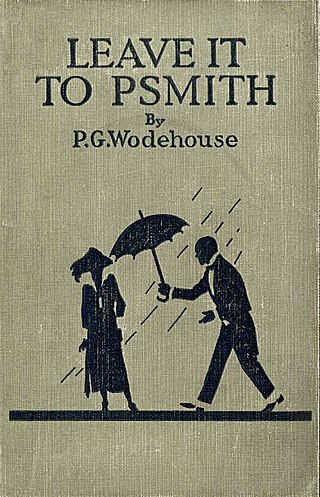
Leave It to Psmith is a comic novel by English author P. G. Wodehouse, first published in the United Kingdom on 30 November 1923 by Herbert Jenkins, London, England, and in the United States on 14 March 1924 by George H. Doran, New York. It had previously been serialised, in the Saturday Evening Post in the US between 3 February and 24 March 1923, and in the Grand Magazine in the UK between April and December that year; the ending of this magazine version was rewritten for the book form.

Eggs, Beans and Crumpets is a collection of short stories by P. G. Wodehouse, first published in the United Kingdom on April 26, 1940 by Herbert Jenkins, London, then with a slightly different content in the United States on May 10, 1940 by Doubleday, Doran, New York.
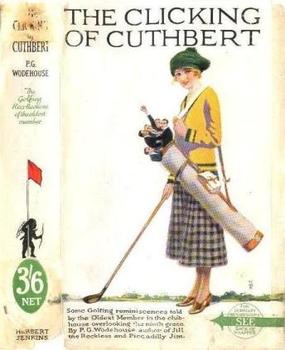
The Clicking of Cuthbert is a collection of ten short stories by P. G. Wodehouse, all with a golfing theme. It was first published in the United Kingdom on 3 February 1922 by Herbert Jenkins Ltd of London. It was later published in the United States by George H. Doran of New York on 28 May 1924 under the title Golf Without Tears. The short stories were originally published in magazines between 1919 and 1922.

Piccadilly Jim is a novel by P. G. Wodehouse, first published in the United States on 24 February 1917 by Dodd, Mead and Company, New York, and in the United Kingdom in May 1918 by Herbert Jenkins, London. The story had previously appeared in the US in the Saturday Evening Post between 16 September and 11 November 1916.

The Man Upstairs is a collection of short stories by P. G. Wodehouse, first published in the United Kingdom on 23 January 1914 by Methuen & Co., London. Most of the stories had previously appeared in magazines, generally Strand Magazine in the UK and Cosmopolitan or Collier's Weekly in the United States. Although the book was not published in the US, many of the stories were eventually made available to US readers in The Uncollected Wodehouse (1976) and The Swoop! and Other Stories (1979).
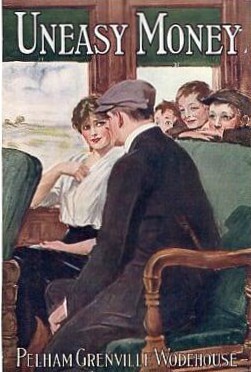
Uneasy Money is a novel by P. G. Wodehouse, first published in the United States on 17 March 1916 by D. Appleton & Company, New York, and in the United Kingdom on 4 October 1917 by Methuen & Co., London. The story had earlier been serialised in the U.S in the Saturday Evening Post from December 1915, and in the UK in the Strand Magazine starting December 1916.

A Damsel in Distress is a novel by P. G. Wodehouse, first published in the United States on 4 October 1919 by George H. Doran, New York, and in the United Kingdom by Herbert Jenkins, London, on 15 October 1919. It had previously been serialised in The Saturday Evening Post, between May and June of that year.

The Small Bachelor is a novel by P. G. Wodehouse, first published in the United Kingdom on 28 April 1927 by Methuen & Co., London, and in the United States on 17 June 1927 by George H. Doran, New York.

Hot Water is a novel by P. G. Wodehouse, first published on August 17, 1932, in the United Kingdom by Herbert Jenkins, London, and on the same date in the United States by Doubleday, Doran, New York.

Doctor Sally is a short novel by P. G. Wodehouse, first published in the United Kingdom on 7 April 1932 by Methuen & Co., London. In the United States, it was serialised in Collier's Weekly from 4 July to 1 August 1931 under the title The Medicine Girl, and was included under that name in the US collection The Crime Wave at Blandings (1937).
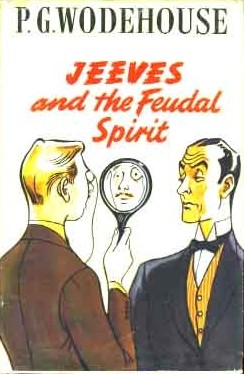
Jeeves and the Feudal Spirit is a comic novel by P. G. Wodehouse, first published in the United Kingdom on 15 October 1954 by Herbert Jenkins, London and in the United States on 23 February 1955 by Simon & Schuster, Inc., New York, under the title Bertie Wooster Sees It Through. It is the seventh novel featuring Bertie Wooster and his valet Jeeves.

Something Fishy is a novel by P. G. Wodehouse, first published in the United Kingdom on 18 January 1957 by Herbert Jenkins, London and in the United States on 28 January 1957 by Simon & Schuster, Inc., New York, under the title The Butler Did It.

Service with a Smile is a novel by P. G. Wodehouse, first published in the United States on 15 October 1961 by Simon & Schuster, Inc., New York, and in the United Kingdom on 17 August 1962 by Herbert Jenkins, London. A condensed version of the story had previously been published in two parts in the Toronto Star Weekly, on 26 August and 2 September 1961.

Reginald "Reggie" Pepper is a fictional character who appears in seven short stories by English author P. G. Wodehouse. Reggie is a young man-about-town who gets drawn into trouble trying to help his pals. He is considered to be an early prototype for Bertie Wooster, who, along with his valet Jeeves, is one of Wodehouse's most famous creations.
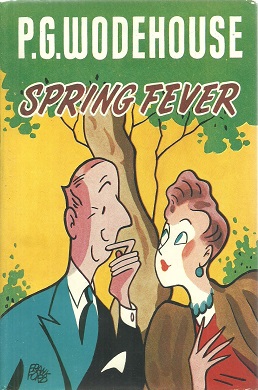
Spring Fever is a novel by P. G. Wodehouse, first published on 20 May 1948, in the United Kingdom by Herbert Jenkins, London, and on the same date in the United States by Doubleday and Co, New York. Although not featuring any of Wodehouse's regular characters, the cast contains a typical Wodehousian selection of English aristocrats, Stoker family relations, wealthy Americans, household staff and imposters.
Come On, Jeeves is a comedic play co-written by Guy Bolton and P. G. Wodehouse. The play was written in the summer of 1952, and toured the English provinces in the summer of 1954. Wodehouse adapted the play into the novel Ring for Jeeves, which was first published in April 1953, a year before the play reached production. Come On, Jeeves is still occasionally produced and was presented as recently as December 2017.
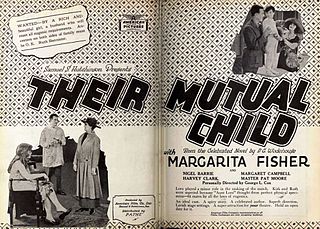
Their Mutual Child is a lost 1920 American silent comedy-drama film directed by George L. Cox and starring Margarita Fischer, Joseph Bennett and Margaret Campbell. It was based on the 1919 novel of the same name by P. G. Wodehouse.
